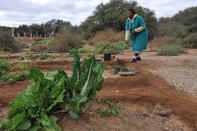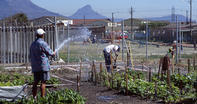A Vegetable Garden in Witsand
It is January 2011 and part of the sandy rectangle at the back of Linah’s house in Witsand has been pulled under a loosely stretched green shade cloth. It is typical Cape Flats soil: powdery, quick running, barely a sign of organic life in it.

This is rock that has been crushed down to sand on the bottom of an ancient sea, and later deposited into dunes. It has about as many nutrients for plants as a slice of white bread has for a child these days.
Nevertheless, Linah has put in some lettuce, a few cabbages, green peppers, tomatoes, chillies. Offcuts of two-litre cooldrink bottles have been wedged in between the lines of vegetables here and there as a deterrent to birds or some neighbour’s wayward pets.
There is a scattering of some kind of manure – goat, perhaps, or sheep – that is collapsing under pressure from the elements and hopefully feeding the roots of the plants beneath.
She only started growing vegetables a few months earlier when her manager at the HIV/AIDS network gave her seeds. The idea was that if she and the other volunteers had some extra vegetables to harvest, they could give them to their clients. ‘Vegetables are good for everybody, because you get proteins, minerals, everything. If you are feeling weak, it makes you strong.
Especially spinach.’ Her face cracks into a gap-toothed grin. ‘Oh, it’s number one! Spinach is number one vegetable.’ Like most things living, these vegetables need water. But without a tap near the beds, and with the blind eye of the shut-off trickle-feed metering system sticking to its own unblinking mandate, watering vegetables becomes a tad more complicated that just pointing the nozzle of a hosepipe at them and turning on a tap.
Sometimes, she will take the water from the kitchen sink once she has done with the dishes. If there is no water in the house, she might send her children off to the toilet block that has been set up for the shack dwellers a few hundred metres away, down near the resource centre. There are standing taps there where people can help themselves, as long as they have buckets and the muscle power to hoist it back home.
For every litre of water carried, it amounts to one kilogram in weight – 20 kg of water might be quick and easy to draw through a tap, but it is a little tougher to haul it home on the balled-up end of an arm. Come January 2012, and the vegetables are gone. Not for lack of will, but Linah has been out of town for a month.
Like so many of the economic migrants to the Mother City, Linah is from the Eastern Cape (Mdantsane, outside East London) and she does the usual trek back home every Christmas. There is no point in having vegetables toiling away in the belting summer sun if there is no one to tend to them or harvest them once they are ready to eat. She says she might replant vegetables now that she is back, but she is a bit non-committal.
Urban Food Gardens are not a Simple Solution
Even though vegetable growing seems like the most obvious way for poor people to bridge a bit of the gap between their hunger and the occasional inaccessibility of food, mostly due to the cost, the urban food garden is not as simple a solution as it might seem.
The research done by the African Food Security Urban Network (AFSUN) in key Southern African cities shows that, in Cape Town at least, vegetable growing is not an important livelihood strategy, even though this appears to be the only municipality on the continent with a formalised urban agriculture policy.
AFSUN is not entirely sure why people in this metropolis are not keen on gardening, but its researchers suspect it has something to do with the naturally dire state of the soils here, as well as the high water table where parts of the Cape Flats flood regularly in winter, lack of access to suitable land, a shortage of horticultural knowledge and skills, time constraints and possibly a lack of the appropriate assets.
These poor growing conditions in the Cape are already a good reason why many people avoid tending their own vegetables. And now the pressure of climate change makes urban agriculture an increasingly unlikely prospect for this city’s residents – already scarce water resources will be pushed to the very limits by the city’s growing demands when it is already approaching the ceiling in terms of available water supplies.
Meanwhile, climate change is going to make weather conditions here less favourable to growing food: rising temperatures by between 0.5 and 3 degrees Celsius along the coast; a possible loss of winter rainfall by as much as 25%; increased late-summer flooding; wind speeds that are likely to pick up as the air becomes hotter, drier and moves faster; and the resulting likelihood of fires, which are notoriously problematic in the shacklands of Cape Town. These kinds of scorching winds also burn vegetables without even a lick of flames touching them.
Why Poor People Won’t Grow Food

Almost without fail, whenever the issue of food security comes up in the context of city living, the conversation steers towards food gardens. And how much more so for the urban poor – if people are unemployed, they have loads of time on their hands, right? If their children need to be kept full-bellied, satisfied and well nourished, just give them some seeds, spades and watering cans and let them get on with it. There is something of a tacit judgement in this assumption, too.
That when the poor and unemployed do not take up the spade and hoe, they are somehow indolent or unwilling to help themselves. But there are good reasons why poor people might be hesitant to invest what time or resources they have in the risky business of growing food.
They may decide against sinking an already overstretched income from a social grant or casual labour into keeping chickens or growing cabbages, when they could wake one morning to find the whole investment has been stolen during the night. The difficulty of getting water to irrigate their gardens through a dry spell means several weeks’ worth of work could get wiped out in a single afternoon of blazing heat.
The cost of seeds might be prohibitive. Or the frustration of trying to keep a garden healthy in such poor soils might just become an obstacle too large to scale with limited support systems for an under-resourced community.
Preference to Earn an Income
For many, there is a strong cultural reason to shun the urban food garden: vegetable growing is the antithesis to city living; it is not modern; it is old-fashioned, backward; it is not what you do when you leave the provinces. You came here to leave behind the life of a peasant – why would you want to return to the soil?
And basic economics lie at the root of the issue for others: if they have labour to exchange for anything, they need to exchange it for a wage come Friday, not the promise of spinach leaves in several weeks’ time. Some food gardens in the Cape only have people working them because they see it as a wage-earning job opportunity, not because they want to become more food secure.
Writing about the reasons for many food gardens not taking off in Khayelitsha, about an hour’s drive from Witsand, the United Nation’s Food and Agriculture Organisation had this to say: ‘The notion of farming characterized by physical effort and hardship in general remains an issue for recent migrants to urban slums.
Dwellers of the informal settlement of Khayelitsha are willing to engage in communal gardening only to the extent that they need to do it for survival and have no alternative. They prefer to earn an income and to purchase food instead. Of those who work in the community gardens, the majority leave as soon as they have found a source of revenue.
The result is that what were created as “community gardens” to meet the food needs of the Khayelitsha communities are now being transformed into businesses of market gardening and produce is sold to local markets where community dwellers do their food purchasing. Those individuals remaining active in the community gardens now consider themselves as “employees” in some sort of a cooperative arrangement from which they draw revenue.’
By Leonie Joubert